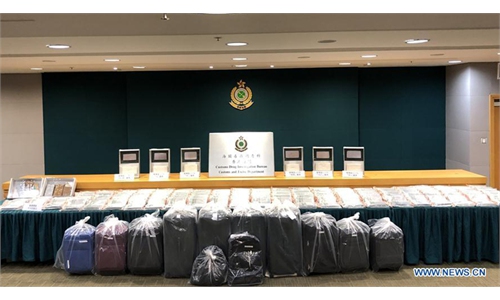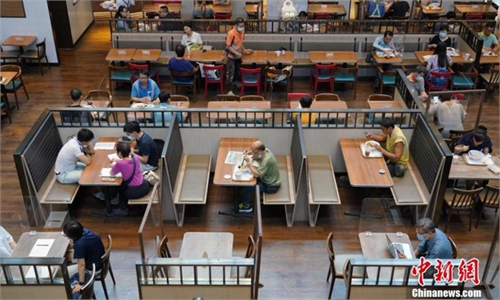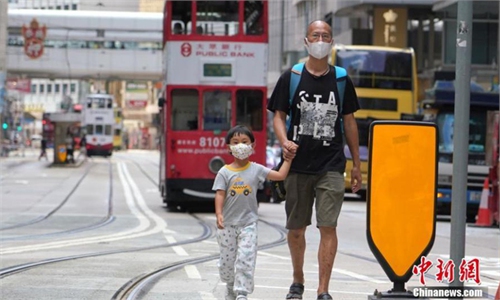BEST OF JUNE / REPORTER1
Hong Kong LegCo election postponement urged
Social environment would be fairer, safer next year: analysts
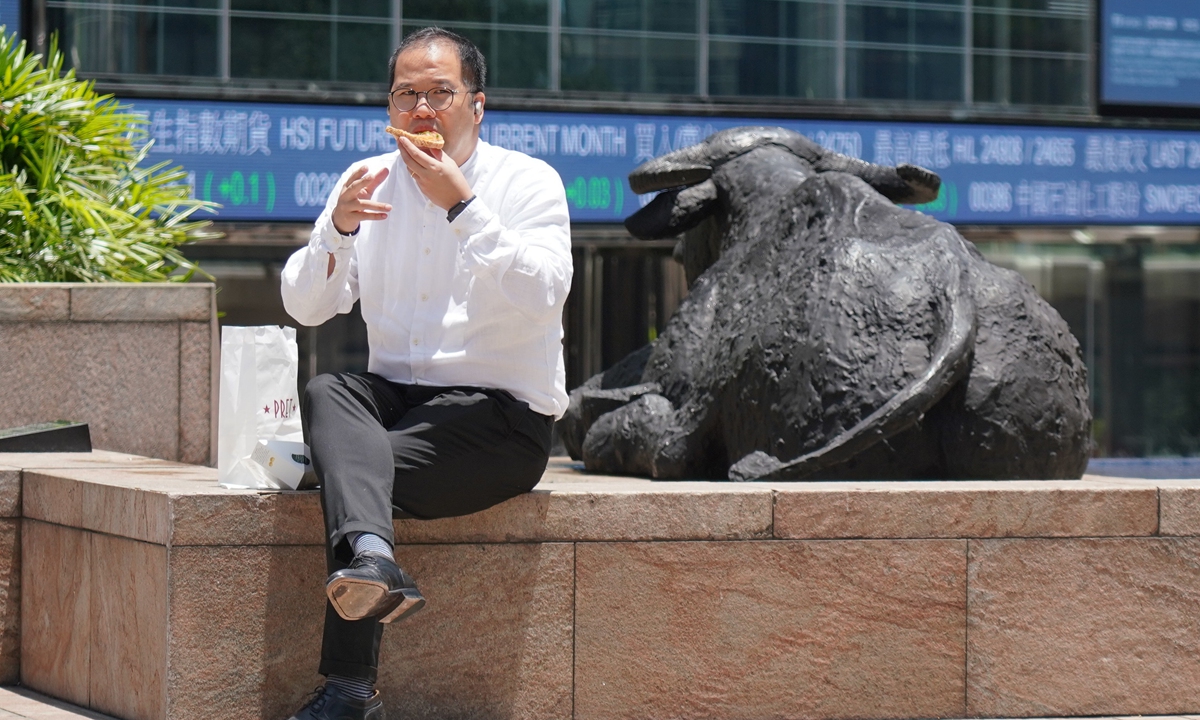
An office worker eats outside Hong Kong's Exchange Square on Wednesday. In response to the COVID-19 epidemic, all in-restaurant dining in Hong Kong has been banned since Wednesday, with many office workers lining up to buy take-out meals. Photo: cnsphoto
As Hong Kong is facing the third wave of a serious COVID-19 epidemic, many local social organizations and residents have urged the HKSAR government to postpone the Legislative Council (LegCo) election, scheduled for September.
Experts and local politicians said that if the decision were made, it would be "reasonable, rational and legitimate."
Hong Kong media, including TVB News and hk01, reported that the HKSAR government has already submitted the proposal to postpone the election to the National People's Congress (NPC) Standing Committee, as the decision would impact the constitutional arrangement, so the decision must be made by the top national legislature.
As the four-year term for the current LegCo lawmakers ends in September, the HKSAR government will also recommend that the NPC Standing Committee extend the terms of the current LegCo to avoid a "one year vacuum period" of the HKSAR legislature due to the special situation that Hong Kong is being confronted with.
Since the third wave of the epidemic hit Hong Kong earlier in July, and as the situation gets increasingly serious and unlikely to be put under control anytime soon, many local and overseas social organizations consisting of Hong Kong residents and politicians have urged the Hong Kong government to consider postponing the LegCo election, including former president of the LegCo Jasper Tsang Yok-sing and Tam Yiu Chung, a member of the National People's Congress Standing Committee.
Social organizations like the Silk Road Institute, a Hong Kong-based think tank, and Politihk Social Strategic also urged for the postponement as the Hong Kong government and the electoral affairs commission are unable to guarantee public health safety.
Prioritizing public health
Junius Ho Kwan-yiu, a LegCo lawmaker, who also submitted a letter to Chief Executive Carrie Lam suggesting to postpone the election, told the Global Times on Wednesday that the government needs to be responsible for public health, because during an election, it is impossible to guarantee social distancing, in a time when restaurants in the city are not even allowing more than two people to sit around one table.
Li Xiaobing, an expert on Hong Kong affairs at Nankai University in Tianjin, told the Global Times on Wednesday that the concerns are reasonable, and Hong Kong is not the only city in the entire world to postpone elections.
The mainland has postponed the two sessions, the most important annual political events, earlier this year due to the epidemic. Russia has moved its constitutional referendum from March to July. Sixteen states in the US postponed presidential primaries for the same reason. The UK also postponed local and mayoral elections in England for a year to May 2021.
Some Western media and Hong Kong opposition politicians are trying to misinterpret the motive of the postponement, saying that the government is "afraid of another failure like [the one in] November 2019," referring to the district council elections of the HKSAR that the opposition overwhelmingly won.
Li said these people ignore the dangers of the coronavirus, and they don't care about public health, but are only interested in building momentum based on the radical atmosphere of the 2019 turmoil. This is how they won the district council elections last year, which was unfair for the pro-establishment camp and the society.
Tian Feilong, a legal expert on Hong Kong affairs at Beihang University in Beijing, said that waiting one more year is necessary, as the Hong Kong epidemic situation is serious, and scientists also predicted that a new wave will come and hit not only Hong Kong but the world in the fall or winter this year.
When the Hong Kong government and the local public health authority have no idea about how long it would take to control the epidemic situation, "public health should always be the priority, and it's much more important than an election," Tian said.
The HKSAR government news website said on Tuesday that Hong Kong has 106 new cases in a day, and 98 of them are local cases. The latest data released by the government website on Wednesday showed that Hong Kong has 2,885 confirmed cases.
Ho said if current LegCo lawmakers have one more year to prepare, they can "recoup the loss of time caused by the riots and violence in 2019, and the epidemic situation in 2020," to restore public order and recover the economy, and also push the national security legislation under the Basic Law, also known as Article 23.
Ho noted that in one year the Hong Kong people would be able to vote for the lawmakers under a safe, fair, peaceful and rational environment.
Tian said that after the 2019 turmoil, and with the COVID-19 epidemic and US sanctions, Hong Kong society has been harmed deeply, and the public will is wavering and even getting nervous, cynical and irrational.
"So, the society is unable to elect a rational and responsible LegCo under such an environment," Tian noted.
Tian said that if the HKSAR government wants to postpone the election, they can find legal basis in the Emergency Regulations Ordinance and Prevention and Control of Disease Ordinance, and this regulation will not be limited by the Legislative Council Ordinance.
Another way is to submit a proposal to the NPC Standing Committee, and the decision made by the top national legislature will not face judicial review from Hong Kong courts, Tian said.
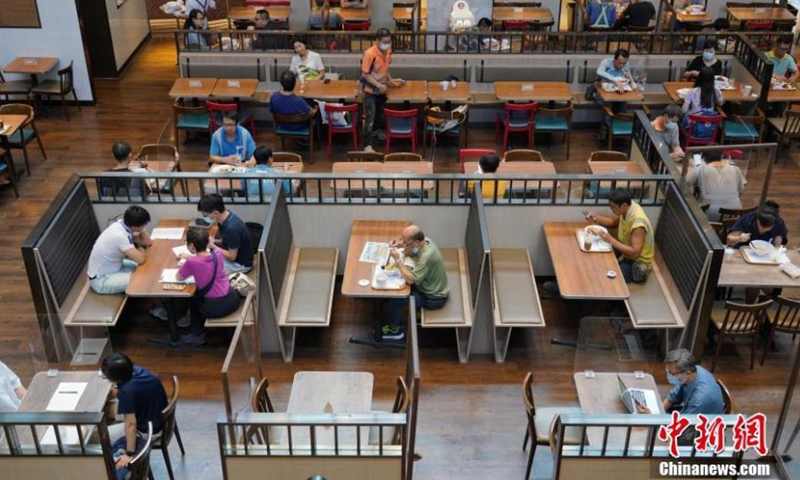
Photo shows people dine in a restaurant in Hong Kong, July 27, 2020. Hong Kong announced further tightening of anti-epidemic measures, including prohibition of dining-in services in restaurants and mandatory mask-wearing in all public places, which will come into effect on Wednesday.Photo:China News Service
Fairness matters
Apart from the public health issue, fairness is also an important factor that the government and the national legislature must consider, Hong Kong politicians and organizations said.
Lawmaker Chan Kin-por, chairman of the HKSAR LegCo Finance Committee, told the Global Times on Tuesday, "In September, if the epidemic situation remains serious, many residents would not go out to vote, and then the election would not be fair. These are the factors that the government and electoral affairs commission must take into consideration."
Chan added that the opposition parties will surely oppose the decision because they know that hundreds of thousands of Hong Kong residents will return from overseas and the mainland to vote. And if the epidemic situation remains uncontrolled, these voters will be quarantined or they will even choose not to come back and vote. This is truly unfair for the pro-establishment camp.
"The opposition cares about only their political goal and totally ignores public health and fairness of the election," he said.
Lau Siu-kai, vice president of the Chinese Association of Hong Kong and Macao Studies, told the Global Times that "if opposition candidates are really confident in winning the election, and most residents don't support the postponement, why would they be angry now? They should be happy, as they can win more seats next year if the people really support their ideas."
Guangdong-Hong Kong-Macau Greater Bay Area Youth Association, an organization consisting of Hong Kong youth working and doing businesses in the mainland and other countries to seek opportunities for Hong Kong youth in the Greater Bay Area, said in a statement on Wednesday it is urging the postponement because hundreds of thousands of Hong Kong residents who live outside Hong Kong are unable to return to Hong Kong and vote, and even if some of them come back, they have to be quarantined for 14 days due to the epidemic situation.
Augus Ng, executive president of the association, told the Global Times on Wednesday that after the epidemic situation erupted earlier this month, many Hong Kong residents, including many members of his association, left Hong Kong for other countries and the mainland cities, especially Shenzhen, and "most of them are unlikely to return due to the ongoing epidemic situation, but it doesn't mean they don't want to vote."
"If the election pushes through in September, their legitimate rights to vote will be denied, so it's unfair," he said.
The Silk Road Institute also said on July 20 that after the enactment of the national security law for Hong Kong, that foreign forces are continuing to use their proxies in Hong Kong to incite conflicts between local residents and mainland people, or create fear in society toward the central government by misinterpreting the new law through misinformation, according to the think tank's facebook account.
"This is no different from interfering in the LegCo election. Law enforcement agencies still need time to investigate the relevant cases." But the negative impact on the election has already formed. In the short term, the fairness and justice for the election are unlikely to be fixed, and the illegal "primaries" earlier this month have already made the election unfair, the think tank said.

